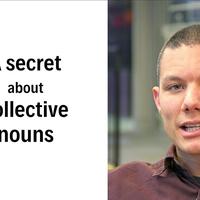A secret about collective nouns - English In A Minute - YouTube
секрет о|||||||||
|||coletivas||||||
một|||||||||
Ein Geheimnis über Sammelbegriffe – Englisch in einer Minute – YouTube
A secret about collective nouns - English In A Minute - YouTube
Un secreto sobre los sustantivos colectivos - English In A Minute - YouTube
Un secret sur les noms collectifs - English In A Minute - YouTube
Un segreto sui sostantivi collettivi - English In A Minute - YouTube
集合名詞の秘密 - English In A Minute - YouTube
집합명사에 대한 비밀 - 1분 안에 영어 - YouTube
Paslaptis apie bendrinius daiktavardžius - English In A Minute - YouTube
Sekret rzeczowników zbiorowych - English In A Minute - YouTube
Um segredo sobre os substantivos colectivos - Inglês Num Minuto - YouTube
Секрет о собирательных существительных - English In A Minute - YouTube
Ortak isimler hakkında bir sır - English In A Minute - YouTube
Секрет про збірні іменники - English In A Minute - YouTube
Một bí mật về danh từ tập hợp - English In A Minute - YouTube
关于集体名词的秘密 - 一分钟英语 - YouTube
关于集合名词的秘密 - 英语一分钟 - YouTube
Hi, I'm Dan from BBC Learning English
|I am|||||
Hallo, ich bin Dan von BBC Learning English
Chào, tôi là Dan từ BBC Learning English
and today I'm going to tell you something about
và hôm nay tôi sẽ nói với bạn điều gì đó về
collective nouns.
collective|
|substantivos
колективні|іменники
Sammelbegriffe.
danh từ tập hợp.
Collective nouns are often called group nouns.
собирательные||||||
Kollektivnomen werden oft als Gruppennomen bezeichnet.
Danh từ tập hợp thường được gọi là danh từ nhóm.
That is because they represent a number of
||||представляют собой|||
||||представляють|||
Das liegt daran, dass sie eine Reihe von darstellen
Điều đó là vì chúng đại diện cho một số lượng
things together.
Dinge zusammen.
Examples are:
Beispiele sind:
government, family and team.
Regierung, Familie und Team.
So, what's the big deal?
Also, was ist die große Sache?
The special thing about these collective nouns
|special|||||collective nouns
Das Besondere an diesen Sammelbegriffen
is that they can be singular or plural.
|||||số ít||số nhiều
||||||или|
ist, dass sie Singular oder Plural sein können.
Điều đó là chúng có thể là số ít hoặc số nhiều.
If you consider your family to be a group of individuals,
||рассматривать||||||||индивидов
||||||||||indivíduos
||coi||||||||
Wenn Sie Ihre Familie als eine Gruppe von Einzelpersonen betrachten,
가족을 개인으로 간주하는 경우,
Nếu bạn coi gia đình của mình là một nhóm cá nhân,
then the pronoun is they and the verb is plural.
||eles|||||||
dann ist das Pronomen sie und das Verb Plural.
인 경우 대명사는 '그들'이고 동사는 복수형입니다.
thì đại từ là 'họ' và động từ là số nhiều.
My family are happy.
Meine Familie ist glücklich.
Gia đình tôi thì hạnh phúc.
But your family can also be considered as a single unit,
Aber Ihre Familie kann auch als eine Einheit betrachtet werden,
Nhưng gia đình của bạn cũng có thể được coi là một đơn vị đơn lẻ,
a machine that all works together.
|||||in unison
eine Maschine, die alle zusammenarbeitet.
một cỗ máy mà tất cả cùng hoạt động chung.
In this case, the pronoun is it and the verb is singular.
|this||the||is||||||
In diesem Fall ist das Pronomen it und das Verb Singular.
My family is happy.
Meine Familie ist glücklich.
This does not apply to all collective nouns,
|||стосується||||
Dies gilt nicht für alle Sammelbegriffe,
이는 모든 집합 명사에 적용되는 것은 아닙니다,
Điều này không áp dụng cho tất cả các danh từ tập hợp,
so be careful.
therefore||
||tenha cuidado
also sei vorsichtig.
nên hãy cẩn thận.
Police and staff are always plural.
||Personal|||
Polizei und Personal sind immer Plural.
Cảnh sát và nhân viên luôn ở dạng số nhiều.

